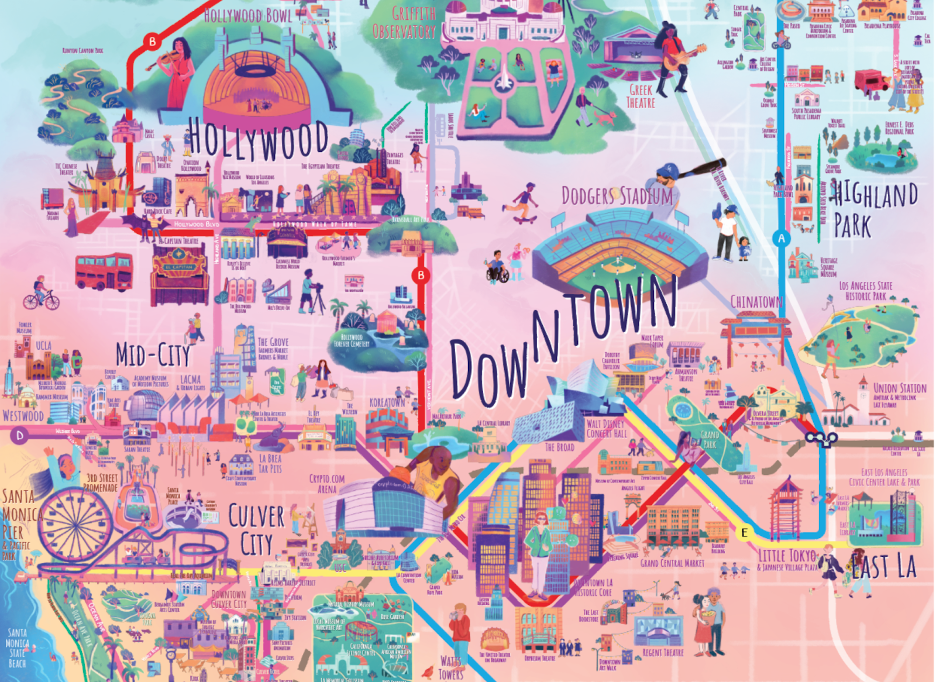Entertainment
Can ‘Transit-Oriented Entertainment’ Help End the National Ridership Decline? — Streetsblog USA

Cities across the U.S. continue experimenting with a variety of strategies to boost transit ridership. While these efforts are commendable and have achieved some modest successes, getting a meaningful number of Americans to try transit in the first place has proven a very thorny problem.
Why?
While it’s impossible to boil down all of America’s diverse transit challenges in one short article, I have noticed a few general themes in my advocacy work with Streets For All in greater Los Angeles — and some might be familiar in other U.S. cities.
First, too many folks hold misconceptions about the true reach, speed, safety, and reliability of transit in their region, many of which are shaped by secondhand, sensationalized, or outdated information.
Second, just like learning to drive for the first time, there’s a learning curve with transit. Understanding routes, planning trips, setting up payment systems, and timing journeys to avoid delays all take some getting used to.
Third, decades of car-centric urban development and auto glorification through media and ads have shaped our cities and our personal routines. Even when transit options improve, people’s longstanding reliance on their cars, combined with the perceived convenience of driving, makes entrenched car habits hard to break.
The Current Uphill Battle
Current efforts to boost transit ridership have largely targeted commuters. At first glance, this makes sense. Commuters are the folks who, in theory, should be regular riders, and in practice, are regular users — at least in cities with robust transit networks.
I myself have tried this approach. A few family members live and work along LA’s speedy Metro Rail lines, but their commutes are long and gridlocked. When I have casually pointed out that they could significantly cut their trip times with Metro, they have dismissed the idea, evoking one of the above misconceptions about safety, reliability, or reach.
However, my background in user experience — along with my years of advocacy at Streets For All — have led me to suspect another reason why so many are reluctant to try transit.
Asking people to forgo an established routine during an already stressful workweek, even for a day or two to try an alternative, is an incredibly big ask. Under the weight of the work week, people do not feel like they have time or bandwidth to experiment.
Flipping the Script
Streets For All and Have A Go have teamed up to try a fresh approach to address this reluctance with a new initiative: Unlock Your City.
Rather than the usual focus on commuters during the hectic workweek, this program targets the public at large during the weekends, which tend to be more flexible for many U.S. residents. Not only are weekends when people seek out novel experiences, it is when they willingly put in time and effort for such experiences such as waiting in long lines for trendy food trucks, battling crowds at concerts or theme parks, or driving to distant hikes.
Unlock Your City aims to tap into this adventurous and open mindset and offers urban dwellers a way to skip the hassles and costs of car travel — traffic jams, parking hunts, high gas prices — and instead use transit to explore their city.
The approach can be described as Transit-Oriented Entertainment.
What Is Unlock Your City?
At its core, Unlock Your City is a transit ridership initiative that we hope doesn’t feel like a traditional transit campaign. It’s an invitation to explore your own city with fresh eyes, using public transit as a feature — to avoid traffic, be social, go green — instead of as an obligation.
The centerpiece of the program’s first edition is a beautifully illustrated map of Los Angeles’ subway and BRT lines, highlighting dozens of points of interest that are easily accessible by transit. The map is reminiscent of tourist maps you might find when visiting a new city, showing key attractions — but it’s targeted at locals who want to experience their communities through fresh eyes. We aim to develop such maps for other cities where transit is currently robust, fast, and safe enough to recommend using for leisure.

In addition to the map, Unlock Your City will offer a growing library of self-guided tours, designed to make city exploration easier by offering a set of activities around different themes like food, music, nature, sports, etc. that could be completed together in a single half day or full day outing. Some of these tours are curated by local influencers or organizations providing unique perspectives and hidden gems.
A Tool For Collective Culture Change?
Except for select cities, transit unfortunately has quite a low status in American culture. It’s too often seen and portrayed as the means of last resort for transportation — and that’s putting it politely.

Unfortunately, this portrayal is sometimes true, especially in communities where transit has been deliberately underfunded for decades. But it does leave us with a self-reinforcing cycle of keeping transit outside the reality of too many Americans, even in places where it is or has been improved to be safe, functional, useful, and/or comfortable. We have a long way to go to overcome the infrastructural and cultural barriers to achieve the saying that “a wealthy country isn’t where the poor can afford cars, but where the rich choose to use public transportation.”
Making trains and buses trendy isn’t going to happen with a single initiative. But with hundreds of initiatives and thousands of people pairing transit with fun, enjoyable, and enriching weekend experiences, perhaps we can gradually turn a modest proposal — fun city exploration on transit — into a larger movement of cultural change.
Unlock Your City will launch in Los Angeles under the moniker Unlock LA during Move LA’s first-ever Transit Week. More details at https://streetsforall.org/unlock-la.
Guest submissions do not always reflect the views of Streetsblog USA.










